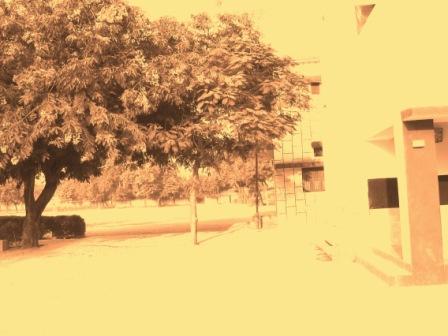Have you seen one who denies the deen? (religion/judgment)
That is the one who repulses the yateem (orphan)
And urges not the feeding of the miskeen (indigent)
Ah, woe unto the musalleen (those who pray)
Who, of their prayers, are saahoon (unmindful)
Who want to be yuraaoon [seen (at prayer)]
Yet refuse al-maaoon (small kindnessess / neighbourly needs).
----
Tried a different way of translation: keeping the last word in the original to preserve the rhyme and give a sense of how lyrical the original sounds.
Source: any guesses?! (not my usual area of 'expertise')
Friday, April 18, 2008
Saturday, April 12, 2008
Dharma
"Metaphorically then, not to open your water taps fully while shaving is dharma; not to jump the red light on the traffic signal is dharma; and not to pollute the air we breathe is dharma."
"In India nearly every situation is encountered as a first-time situation and people respond to them as such- so for sheer survival one has to be extremely intelligent. You have to be extremely intelligent to grasp in a split second that the traffic cop has no vehicle to chase you with, and so you can jump the red light with impunity. Or judge in the flash of an eye whether he has a pen and notebook with him to jot down your number- if he does not have these with him, you assume it is safe to ignore his signal to you to pull over. Or to figure out, when on impulse you spit copiously on the street from the safety of your balcony and a poor pedestrian happens to intercept your wad, that there is precious little he can do, short of DNA testing, to prove that it was you who spat."
"When I jump a queue or a red light, or throw that garbage on the sidewalk, I am taking a rational 'squeal' decision, since it seems to get me ahead of others or make life easier for me. Here I am being privately smart. But then, as others are no less rational, intelligent and smart, they too start 'squealing' for the same reasons, and before we know it, we have unruly traffic, filthy streets and stinking urinals. So collectively we are worse off, just as the two prisoners in the dilemma. And then we complain about a dirty country, a polluted city and apalling traffic. In short, publicly we emerge dumb."
"...It was Nobel laureate John Nash who first turned his attention to rivalries with mutual gain, that is, non-zero-sum situations, where one does not have to win at the cost of another, as both parties can emerge winners."
From "Games Indians Play" by V. Raghunathan.
"In India nearly every situation is encountered as a first-time situation and people respond to them as such- so for sheer survival one has to be extremely intelligent. You have to be extremely intelligent to grasp in a split second that the traffic cop has no vehicle to chase you with, and so you can jump the red light with impunity. Or judge in the flash of an eye whether he has a pen and notebook with him to jot down your number- if he does not have these with him, you assume it is safe to ignore his signal to you to pull over. Or to figure out, when on impulse you spit copiously on the street from the safety of your balcony and a poor pedestrian happens to intercept your wad, that there is precious little he can do, short of DNA testing, to prove that it was you who spat."
"When I jump a queue or a red light, or throw that garbage on the sidewalk, I am taking a rational 'squeal' decision, since it seems to get me ahead of others or make life easier for me. Here I am being privately smart. But then, as others are no less rational, intelligent and smart, they too start 'squealing' for the same reasons, and before we know it, we have unruly traffic, filthy streets and stinking urinals. So collectively we are worse off, just as the two prisoners in the dilemma. And then we complain about a dirty country, a polluted city and apalling traffic. In short, publicly we emerge dumb."
"...It was Nobel laureate John Nash who first turned his attention to rivalries with mutual gain, that is, non-zero-sum situations, where one does not have to win at the cost of another, as both parties can emerge winners."
From "Games Indians Play" by V. Raghunathan.
Subscribe to:
Comments (Atom)





